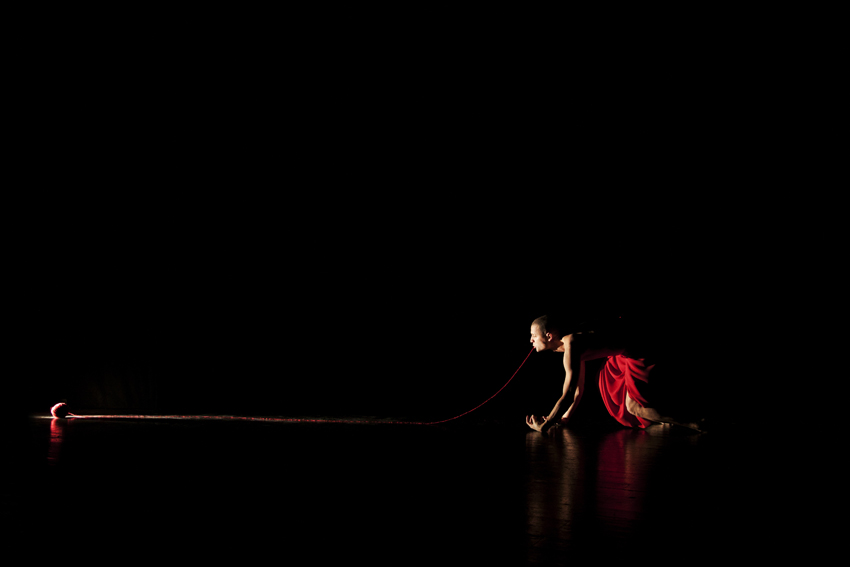 | |||
| Alessandro Pintus, Rubedo, 2013/ Foto: Simona Toncelli |
ooooooooooooooooooooooooooooooooo
ooooooooooooooooooooooooooooooooooo
"kill butoh in order to let butoh be born again"
Vor zwei Tagen kam Alessandro Pintus von Rom nach München auf das Sea.Sons Butoh-Festival und lotet seitdem die Bühne des i-camp mit einem roten Wollknäuel aus. Alessandro Pintus ist Butohtänzer aus Italien, ein tanzender Butohist, Dramatik und Komik in Persona und ein absoluter Performer.
Pintus' Premiere „Rubedo“, die
gestern in München uraufgeführt wurde, war ein riesen Erfolg. Die
Performance ging länger als geplant, nahm ungeahnte Wendungen und
endete schließlich mit einer unerwarteten Brandverletzung des
Künstlers an seinem linken Zeigefinger, weil ihm während der
Vorstellung die Spucke ausgegangen war. Heute Abend führt er Rubedo
erneut im i-camp auf. Angesichts der Tatsache, dass
unkontrollierbare Momente im Tanz von Alessandro eine zentrale Rolle
einzunehmen scheinen, die unter Umständen auch das Publikum
betreffen können, verspricht die Performance heute abend ein
einziges Abenteuer zu werden. Wer dieses Ereignis verpasst hat, kann hier
als Trost ein Interview lesen, dass ich gestern mit dem Butohisten
geführt habe.
Alessandro, how did you first meet
butoh?
That was 1996. I was studying
psychology in rome and was playing in a theatergroup. My teacher
asked me to play a certain role. I did not get it, and he gave me the
advice to take a look at Michael Clark. I was fascinated by the play
of Michael Clark. He was not playing, he was dancing his role, he was
mooving his body to play. Then I found out, that Michael Clark was
involved in Butoh...and that's how i got to Butoh.
What happend then?
First I lost my self. I took part in
workshops in Italy. But i was not satisfied. Then i took part in
workshops in Europe. But still i was not satisfied. Two years i
studied in Japan, at the Kazuo Ohno Studio, i made a lot of research,
met different teachers, met Hijikatas wife, who was still alife.
Finally i found myself and went back to Italy.
So, after 12 years of intensive
research, can you tell us please: what the fuck is Butoh?
Buto doesn't exist
(smiling).
ok, thank you for the answer.
You're wellcome
(laughing).
But, could you get a little bit in
detail?
(takes a slug of Tegernseer Hell) Butoh
was Hijikatas research, but Butoh changed. Butoh was also made for
beyond stage, that shares an aesthetic. And the western countries
took the aesthetics as the final result of butoh, but for me butoh is
a philosophy, it is an endless research. The butoh, that i dance on
stage is not butoh, that is just dance, butoh is research, unabling
me to offer me on stage and to give all myself to the audience.
What about the japanese Hijikatas
style?
I think the butoh
which startetd with Hijikata can be an experience again, and all of
us has to do research in our own culture. The germans have to go deep
in their culture and has to study the potentiality of butoh.
Which cultural space is your point
of reference?
I come from
Sardinia, one of the poorest areas in Italy. Sardinia wa isolated for
many years, life is still original, a lot of treasures to discover
there. I had to dig in my heart, in my cave, in my shit and i came
out with this flower (shows me a red flower picked from the garden of
the theater).
You supported Sea.Sons to be the
first Butohfestival in Munich. What was your main intension?
To make the festival not only to an
occassion for dancing butoh. But more to give the the chance for
different generations to come together, to continue their researches,
to exchange ideas and to spread up butoh philosophy.
-----------------------
Panta Rei- Seasons of the Body
Butoh Workshop von Alessandro Pintus
Fr, 24. 5. bis So, 26.5. // 10h bis 18h
Teilnahmegebühr: 160 Euro
Anmeldung bei A.Wenzlik: 0160.96487583
oder S.Büyüktürkler: 0157.39611500
-----------------------
Panta Rei- Seasons of the Body
Butoh Workshop von Alessandro Pintus
Fr, 24. 5. bis So, 26.5. // 10h bis 18h
Teilnahmegebühr: 160 Euro
Anmeldung bei A.Wenzlik: 0160.96487583
oder S.Büyüktürkler: 0157.39611500

Keine Kommentare:
Kommentar veröffentlichen